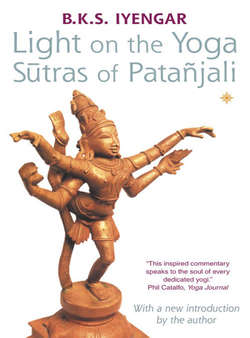Читать книгу Light on the Yoga Sutras of Patanjali - Литагент HarperCollins USD - Страница 63
I.5 vrttayah pañcatayyah klista aklistah
Оглавление| vrttayah | movements, modification |
| pañcatayyah | fivefold |
| klista | afflicting, tormenting, distressing, painful |
| aklistah | untroubling, undisturbing, unafflicting, undistressing, pleasing |
The movements of consciousness are fwefold. They may be cognizable or non-cognizable, painful or non-painful.
Fluctuations or modifications of the mind may be painful or non-painful, cognizable or non-cognizable. Pain may be hidden in the non-painful state, and the non-painful may be hidden in the painful state. Either may be cognizable or non-cognizable.
When consciousness takes the lead, naturally the seer takes a back seat. The seed of change is in the consciousness and not in the seer. Consciousness sees objects in relation to its own idiosyncrasies, creating fluctuations and modifications in one’s thoughts. These modifications, of which there are five, are explained in the next sutra. They may be visible or hidden, painful or not, distressing or pleasing, cognizable or non-cognizable.
The previous sutra explains that the consciousness involves the seer with the objects seen by it, and invites five types of fluctuations which can be divided and subdivided almost infinitely.
Thoughts, when associated with anguish, are known as painful (klista) conditions of the mind and consciousness. For example, a live coal covered with ash appears to be ash. If one touches it, it burns the skin at once. The live coal was in an incognizable, or aklista state. The moment the skin was burned, it became cognizable, or klista. As anguish predominates in pain, the pleasing state cannot be identified with it, though it exists side by side. The pleasure of sex ends in the agony of labour pain at the time of delivery, to be followed by all the cycles of joy, worry and sadness associated with parenthood.
Even highly evolved souls, who have reached a certain spiritual height, as in 1.18 which describes a non-painful, blissful state, are cautioned by Patañjali in 1.19. He warns that, though the yogi remains free while the virtuous potencies continue to be powerful, the moment they fade away he has to strive again, a painful end to the attainment of the spiritual pinnacle. Alternatively, the pains may be hidden, and may appear as non-painful for a long time, until they surface. For example, cancer can remain undetected for a long time until it reaches a painful and tormenting state.
Cognizable pains and anguishes are controlled or annihilated by the practice of yoga, and by willpower. Incognizable pains are prevented from rising to the state of cognition by freedom from desires (vAsanas) and by non-attachment (vairagya), in addition to yogic sadhana.
In II.12, Patañjali uses the words drsta (visible) and adrsta (unperceived, invisible). These may be compared to klista and aklista. Nature causes the five fluctuations to appear in their affictive klista forms, whereas purusa tends to bring them to the aklista state. For example, the klista form of memory is bondage in psychological time, the aklista form is the function of discrimination. Both the painful and non-painful states can be visible or hidden. The known, visible pains and pleasures can be reduced or eradicated. In painful states the ‘non-pains’ may be hidden, and consequently the virtues are difficult to recognize or perceive. Both these states must be stopped by yogic practice and renunciation. In sutras I.23, 27, 28, 33–39, and in II.29, Patañjali underlines the means of reaching the zenith of virtue, which is freedom and beatitude.
The citta acts as the wheel, while klista and aklista states are like the two spokes of the wheel which cause fluctuations and modulations in one’s self. The vrttis in their klista and aklista manifestations are not separate parallel entities, but feed and support each other. For example, the dullness which is the negative aspect of sleep supports the wrong perception of the other modulations of consciousness, whereas the positive experience of sleep (the passive, virtuous state experienced immediately on waking, when the ‘I’ is silent) gives a glimmer of a higher state, encouraging the efforts of right knowledge and discrimination. If the wheel is at rest, the spokes remain steady, and the citta becomes free from vrttis.
(For afflictions, see I.30, 31; II.3, 12, 16, 17.)
